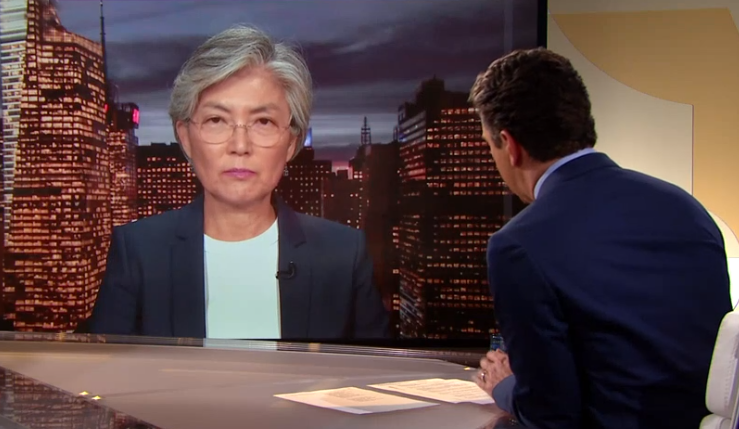뉴포커스
강경화 장관 PBS NEWS HOUR 인터뷰 (9.26.)
- 담당부서
- 정책홍보담당관실
- 등록일
- 2019-09-30
- 조회수
- 7116

Woodruff: All this week, world leaders are gathered in New York for the annual United Nations General Assembly. At his speech this week, President Trump reiterated his position that North Korea could achieve economic greatness if it’s willing to give up its nuclear weapons program. William Brangham gets a view of what progress, if any, is being made on that front from South Korea’s Foreign Minister.
Brangham: President Trump and Kim Jong-un have had two summits and one historic handshake, but not much to show for it. The North Koreans spent the summer testing short-range missiles, and nuclear talks seemed far way. So, how does this situation look from South Korea? For that, I’m joined by Foreign Minister Kang Kyung-wha. She joins me from New York. Foreign Minister, thank you very much for being here. President Trump has continued to try to broker this grand deal with North Korea. They’ve had three meetings thus far, lots of pageantry, but not very much substance. Do you think the North Koreans do want to sign a nuclear deal?
FM: First of all, thank you for having me. But I think, beyond the pageantry, the significance of the summits is, of course, that they build and maintain the trust between the top leaders of the two countries. I think the North Korean commitment to continue dialogue to reach a deal is there. Their recent public messages have confirmed that, so we very much expect the working-level discussions to resume from where things were left off in Hanoi at the end of February. I think President Trump’s messages also confirm the readiness on the side of the United States to pick up where things were left off in Hanoi. And we expect that – because Hanoi didn’t end in an agreement but I think that a silver lining to that was that the two sides came out with a much better understanding on the expectations on the other side of the aisle – when the negotiations resume, there could be a quick progress on all three, four tracks of the agreement that was reached in their first summit meeting in Singapore in June last year.
Brangham: I hear the optimism that you’re conveying there, but the North Koreans have been quite firm that they want economic sanctions off, they want financial aid, and then they’ll be willing to make moves on their nuclear weapons program. The United States wants that order reversed. They want the concessions on the weapons programs, and then sanctions. Do you see way that those two competing threads could be married together?
FM: I think that’s the key. And I think therefore, things have to move in parallel simultaneously. And that’s also the basic agreement of Singapore, to start building improved relations between the two sides, to start working towards peace regime on the Korean peninsula and the North Korean commitment to denuclearization. And I think the U.S. side is committed to moving simultaneously along all three tracks. The fourth track having been the excavation of the MIA remains in the hands of North Korea, that has taken place, we expect that to continue to take place as well, the fourth pillar being the confidence-building measure. But we, of course, work in very close consultations with the U.S., and our discussions with our U.S. colleagues indicate the readiness to move on all four tracks.
Brangham: Is it your sense that there is a commonly understood definition of what “denuclearization” actually means? Because it seems like we’ve had multiple different iterations of what that means. Does that mean that... if North Korea gives up its weapons program but still might be able to have nuclear power or electricity, would that be acceptable, do you think?
FM: I think the concept, the goal is very clear - for us, for the global community. For Korea, the concept of “denuclearization” is spelled out in a joint declaration between South and North Korea on denuclearization dating back to 1993. We’ve live up to our part of that agreement. For the global community, it’s clearly spelled out in the Security Council Resolution. The question is how to get to that goal, how to reach that objective. And I think that North Korea clearly has a different idea of how it wants to reach that goal. But it has committed repeatedly, from the top leader himself, to that goal of complete denuclearization, and so the task is then to spell out a roadmap whereby we could reach that goal.
Brangham: I’d like to turn to the issue of the seemingly worsening relationship between South Korea and Japan. We’ve seen that this is over several issues. One about the forced labor that occurred during WWII and another one towards these debates over export controls. Do you think that this rift can be healed? It seems like it is getting worse every day.
FM: History casts a long shadow, as I always say. And we’re also very close neighbors that have built a very interdependent relationship over the past seven decades. And being optimist as you note, but also being Foreign Minister of my country, we remain committed to resolving the issues through honest dialogue, and good faith. I had my first meeting with the new Foreign Minister of Japan, and my commitment to continue to work with him and his team on all of these difficult tracks remains very strong. I think the issue of forced labor is clarified in our Supreme Court judgment of late last year. And yes, it’s a tough issue, because we have different recollections, different ways in which we want to approach the past. But the trade-restrictive measures for us are clearly unacceptable and retaliatory. But we are committed to finding a way through this very difficult situation through continued diplomatic engagement.
Brangham: Foreign Minister Kang Kyung-wha, thank you very much for being here.
FM: Thank you.
Anchor: 이번 주 내내, 전세계 지도자들은 유엔총회 참석을 위해 뉴욕에 모였습니다. 트럼프 대통령은 이번 주 연설을 통해 북한이 핵무기 프로그램을 포기할 의지가 있다면 괄목할만한 경제 발전을 이룩할 수 있을 것이라는 입장을 재확인했습니다. 윌리엄 브랭엄이 한국 외교부 장관에게 그 부분에 있어서 어떠한 진전이 이루어지고 있는지 들어보았습니다.
Brangham: 트럼프 대통령과 김정은 위원장은 두 차례의 정상회담과 한 차례 역사적인 악수를 나누었지만, 이렇다 할 성과는 크지 않았습니다. 북한은 단거리 미사일 실험을 하면서 이번 여름을 보냈고, 비핵화 대화는 아직 멀어 보입니다. 한국은 이 상황을 어떻게 보고 있을까요? 이와 관련해서 저는 오늘 한국의 강경화 외교부장관님을 모셨습니다. 장관님께선 뉴욕에 계십니다. 장관님, 함께해주셔서 감사합니다. 트럼프 대통령은 북한과 큰 합의를 이루기 위해 지속적으로 노력하고 있습니다. 북미 양 정상은 지금까지 세 차례의 만남을 가졌고, 볼 거리는 많았지만, 실질적인 내용이 부족했다는 지적이 있습니다. 장관님께서는 북한이 진정으로 비핵화 합의에 서명하기를 원한다고 생각하시나요?
FM: 먼저, 초대해주셔서 감사합니다. 제가 생각하기에, 북미 정상간 만남은 화려한 볼거리를 넘어서서, 양측 지도자들 간에 신뢰를 형성하고 유지할 수 있는 계기가 된다는 점에서 중요합니다. 북측에서 합의를 이루기 위해 대화를 지속하고자 하는 의지는 있다고 생각합니다. 북측의 최근 메시지들이 이를 뒷받침하고 있으며, 우리는 지난 2월말 하노이 회담 이후 개최되지 못하고 있는 북미 실무협상이 재개되기를 매우 기대하고 있습니다. 또한, 트럼프 대통령의 메시지 또한 미국이 하노이 이후 상황을 다시 대화를 재개할 준비가 되어있음을 보여주고 있습니다. 비록 하노이에서 북미간 최종 합의에 도달하지는 못했지만, 북미 양측이 상대방 입장에 대한 이해를 높였다는 점에서 긍정적 측면이 있었던 만큼, 협상이 재개되면 작년 6월 제1차 싱가포르 북미 정상회담에서 합의한 3-4가지 분야에 있어 빠른 진전을 이룰 수 있을 것으로 기대합니다.
Brangham: 장관님께서는 상황에 대해 낙관적인 생각을 갖고 계신 것 같은데요, 하지만 북한은 제재 해제, 경제적 지원이 있어야 핵무기 프로그램 관련 필요한 조치를 취할 것이라는 입장을 확고히 하고 있습니다. 미국은 그 반대 순서, 즉 북한이 핵 프로그램을 양보하면, 그 다음에 제재(해제를 논의하는 순서를 원하고 있습니다.) 이처럼 상충되는 양측 입장이 어우러질 수 있을까요?
FM: 그것이 바로 핵심입니다. 모든 것은 동시적ㆍ병행적으로 이루어져야 합니다. 이는 새로운 북미 관계 수립, 한반도 평화 체제 구축 노력, 한반도의 완전한 비핵화에 대한 북측의 공약을 확인한 싱가포르 정상회담에서의 기본 합의사항으로, 미측은 이 세 가지 분야를 동시적으로 추진하겠다는 의지가 있습니다. 북한 내 유해 발굴에 관한 싱가포르 합의의 네 번째 분야는 이미 이루어졌으며, 향후 이것이 지속되어 신뢰구축 조치로 기능할 것을 기대하고 있습니다. 물론 우리 정부는 미국과 긴밀히 협의하고 있으며, 이를 통해 네 가지 분야 모두에서의 진전을 위한 미측 의지를 공유받고 있습니다.
Brangham: 장관님께서는 ‘비핵화’ 정의에 대한 공통의 이해가 존재한다고 생각하십니까? 우리는 지금까지 ‘비핵화’의 의미에 대해 반복되는 서로 다른 주장들을 보았습니다. 그렇다면, 만약 북한이 핵 무기 프로그램은 포기하되, 여전히 원자력 발전 능력을 보유하는 것이 ‘비핵화’로 받아들여질 수 있다고 보시는지요?
FM: 우리 정부와 국제 사회가 생각하는 비핵화의 개념과 목표는 매우 분명합니다. 한국이 생각하는 ‘비핵화’ 개념은 1993(*1992)년 남북이 합의한 공동선언에 잘 나타나 있으며, 우리는 이 선언을 이행하고 있습니다. 국제사회의 ‘비핵화’ 개념은 안보리 결의에 분명하게 나타나 있습니다. 문제는 (비핵화) 목표를 달성하는 방법입니다. 제가 보기에 북한은 비핵화를 달성함에 있어 분명 그들이 원하는 나름의 방식을 가지고 있는 것 같습니다. 그러나 북한이 최고 지도자 차원에서 완전한 비핵화에 대한 의지를 반복적으로 표명해왔으므로, 앞으로 우리에게 남은 과제는 비핵화를 달성하기 위한 로드맵 도출이 될 것입니다.
Brangham: 겉보기에 악화되어 가고 있는 한일관계 이슈로 넘어가겠습니다. 다양한 이슈에 있어서 이러한 일(악화)이 일어나고 있는 것을 볼 수 있었습니다. 하나는 제2차 세계대전 당시의 강제징용 문제이고 다른 하나는 수출규제에 관한 논쟁입니다. 이러한 균열은 해소될 수 있을까요? 매일 더욱 심각해지고 있는 것 같습니다.
FM: 항상 드리는 말씀이지만, 역사는 긴 그림자를 드리웁니다. 한일은 지난 70여년간 굉장히 상호 의존적인 관계를 쌓아온 매우 가까운 이웃국가입니다. 말씀하셨듯 낙관론자이자 한국의 외교부장관으로 말씀 드리자면, 우리 정부는 진실한 대화와 선의로 이 문제들을 해결하기 위한 노력을 지속적으로 기울이고 있습니다. 저는 일본 신임 외무상과 첫 만남을 가졌고, 이 모든 어려운 문제들에 있어 계속해서 그와 그의 팀과 함께 일할 저의 의지 또한 매우 강합니다. 강제징용 문제는 작년 말 대법원 판결에 명확히 나와 있다고 생각합니다. 한일이 서로 다른 기억을 가지고 있고, 과거에 접근하는 방식이 다르기 때문에 어려운 이슈인 것은 맞습니다. 다만 저희에게 (일측의) 무역제한조치는 분명히 받아들일 수 없고 또한 보복적인 성격을 갖고 있습니다. 하지만 우리정부는 지속적인 외교적 관여를 통해 이러한 난국을 타개할 방법을 찾기 위해 노력하고 있습니다.
Brangham: 강경화 장관님, 함께 해주셔서 감사합니다.
FM: 감사합니다.
- 메뉴담당부서
- 정책홍보담당관실
- 전화
- 02-2100-8252


